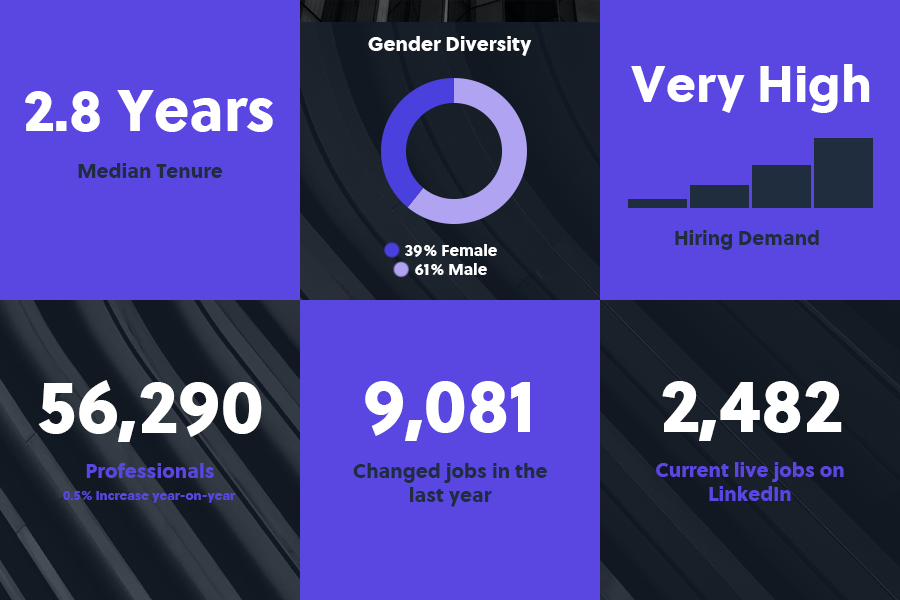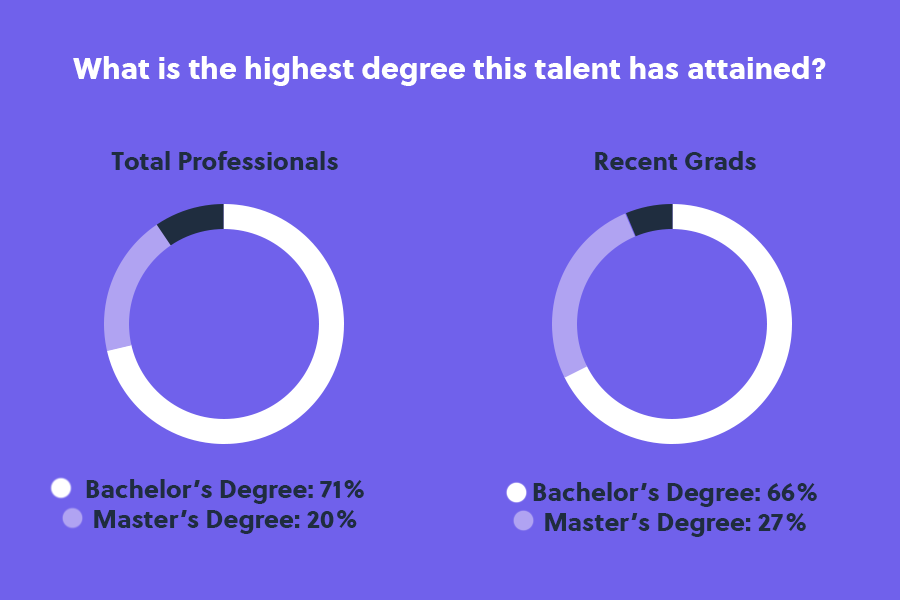As part of the series of insights around our 2023 Insurance Salary Survey, we have analysed the current UK hiring market to understand the trends, challenges and opportunities for the year ahead. Read on for our UK market insights and overview.
Overview

Much like the year before, 2022 saw another year of high hiring demand within the UK Insurance sector. With an average median tenure of 2.8 years, it is evident that the majority of professionals in the industry changed roles post-covid, whilst 16% have changed in the last year. There has been a general rise in salaries across the board as a result of the high demand. But, in spite of this heightened demand, there has only been a 0.5% increase in professionals in the last year, which indicates there aren’t many new professionals entering the market.
Given that insurance businesses thrive on uncertainty, the instability around the financial climate in the UK and the onset of the cost-of-living crisis offer the potential for businesses in the sector to thrive. But, with that being said, businesses within the sector are not immune to these challenges and should therefore also be anticipating further disruption and challenges as a result of these factors.
Top Locations
There has been either no change or negative change in the top 5 most popular locations for Insurance professionals year-on-year, at a rate of between 0% to -1%. The only other notable location is Cardiff, as they are one of the few locations that are significantly increasing at a rate of 4%; however, their demand for hiring isn’t actually as high as other locations in the top 10.
| LOCATION | PROFESSIONALS | JOB POSTS | HIRING DEMAND |
| London Area | 17,244 (1% increase) | 914 | Very high |
| Manchester Area | 3,254 (0% decrease) | 206 | Very high |
| Greater Leeds Area | 2,426 (1% decrease) | 113 | Very high |
| Greater Glasgow Area | 1,691 (1% increase) | 54 | Moderate |
| Birmingham | 1,332 (0% increase) | 105 | Very high |
| Greater Bristol Area | 1,234 (2% increase) | 89 | Very high |
| Greater Liverpool Area | 1,111 (2% increase) | 49 | Moderate |
| Greater Cardiff Area | 915 (4% increase) | 38 | Moderate |
| Tyneside Area | 714 (2% increase) | 23 | High |
| Greater Sheffield Area | 564 (2% increase) | 29 | High |
Job Titles
The prevalence of more junior titles among the talent pool could indicate that the Insurance industry is building a skills pipeline by hiring professionals at a lower level than previously, and then building them up into more senior positions over time.
| TITLES | 1 YEAR GROWTH | PROFESSIONALS |
| Associate Underwriter | 40% increase | 74 |
| Junior Underwriter | 34% increase | 106 |
| Assistant Underwriter | 9% increase | 1334 |
| Senior Underwriter | 5% increase | 3055 |
| Lead Underwriter | 4% increase | 243 |
| Senior Claims Adjuster | 4% increase | 612 |
| Insurance Assistant | 4% increase | 393 |
| Underwriting Assistant | 4% increase | 1576 |
| Vice President of Underwriting | 3% increase | 30 |
| Assistant Claims Manager | 3% increase | 93 |
Education & Institutions
| INSTITUTIONS | PROFESSIONALS |
| Chartered Insurance Institute | 1,299 |
| University of the West of England | 559 |
| Nottingham Trent University | 547 |
| Sheffield Hallam University | 488 |
| Northumbria University | 473 |
| Liverpool John Moores University | 459 |
| London South Bank University | 430 |
| University of Reading | 411 |
| University College of Estate Management | 393 |
| The Open University | 391 |
Interestingly, when comparing recent graduates to the professional body in the industry as a whole, we can see that more people have chosen to stay on at university in order to obtain a master’s degree. This could be indicative of a reluctance to head straight into the world of work, perhaps due to the instability of the current job climate and the difficulty many are facing in securing a position. Or perhaps because so many people have obtained a Bachelor-level degree now, new graduates will need to obtain a master’s degree in order to stand out.

With the hiring market showing no sign of slowing down, the next 12 months are set to be just as busy as the previous ones have been. But, with the shortage of talent continuing to impact ability to hire, HR businesses need to consider their offering and the value they can provide to potential new hires who are spoiled for choice of opportunities.